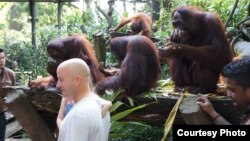Computer games aren’t just for humans anymore. Orangutans, especially young ones, like playing them. And giving these gentle apes “computer time” is just one way that zoos are bringing down the walls - sometimes literally - between humans and their simian relatives.
Open-air, no walls exhibit
Orangutans and humans are remarkably similar - and not just because they share 97 percent of our DNA. They often make tools. They’re one of very few species that can recognize themselves in a mirror. And they can learn new languages. Some, living near humans in Southeast Asia, have even begun to use canoes.
For zoos, these similarities raise a profound question: What kind of orangutan exhibit makes sense? Perhaps none at all. Every morning at the Singapore Zoo, visitors and orangutans simply join each other for breakfast in an open-air pavilion.
Orangutans and humans are remarkably similar - and not just because they share 97 percent of our DNA. They often make tools. They’re one of very few species that can recognize themselves in a mirror. And they can learn new languages. Some, living near humans in Southeast Asia, have even begun to use canoes.
For zoos, these similarities raise a profound question: What kind of orangutan exhibit makes sense? Perhaps none at all. Every morning at the Singapore Zoo, visitors and orangutans simply join each other for breakfast in an open-air pavilion.
"It feels really amazing. You know, you’re really close to them. And they tell you not to reach out for the baby orangutans, because the mothers will get very possessive," said Beckman. "But everyone’s kind of calm. And I did feel safe."
Chicago resident John Beckman took photos of his unusual breakfast, to prove to friends back home that he truly stood just centimeters away from the apes. Cross-species breakfasts are a 25-year tradition at the zoo. But Beckman says it would be hard to imagine something like that here in the United States.
"I don’t know what it would take. You know lawyers tend to start [conducting] risk analyses, when something like this happens," Beckman said. "But I would love it, because I think it really gives you a greater appreciation of the animals."
Six years ago, the Singapore Zoo took down even more walls. Now orangutans use a combination of real and artificial trees to move around the zoo. Often, they swing right over visitors’ heads.
U.S. zoo following openness concept
Halfway around the world in the American Midwest, the Indianapolis Zoo is also creating canopy-height trails. When the zoo’s International Orangutan Center opens in 2014, it will feature different cross-species activities, like computer games.
Halfway around the world in the American Midwest, the Indianapolis Zoo is also creating canopy-height trails. When the zoo’s International Orangutan Center opens in 2014, it will feature different cross-species activities, like computer games.
"They’ll have a chance to do memory games, where both the person and the ape have to remember where things are and work together to solve that task," said Robert Shumaker, vice president of life sciences at the zoo. "Or they may have the opportunity to do things just for fun, like something that will simulate finger painting."
Visitors and apes will also take turns using tools to release a reward.
"The apes will get tokens that they can use basically like money. We actually are creating something like a vending machine. There might be special foods in there. Maybe if it’s getting into the evening, they might want to have a special blanket to cover up with," Shumaker said. "One of the really interesting questions is whether or not they might try to hide their tokens from the other apes or possibly even from us."
Amy Parish has spent 20 years studying apes in captivity. The University of Southern California primatologist says many apes seem quite happy in zoos with plenty of greenery and stimulating challenges. And, she says, zoos do something equally important for the humans who come to see them.
"They engage the public so that they fall in love with these species and start caring about what’s going to happen to them," she said. "I think the next step for zoos is to move not only in the direction of interactive exhibits, but exhibits where the apes get to provoke certain behaviors in us. I’d love to be one of their first volunteers."
And, experts say, the more engaging zoos are, the more likely they can help promote conservation in the wild.





